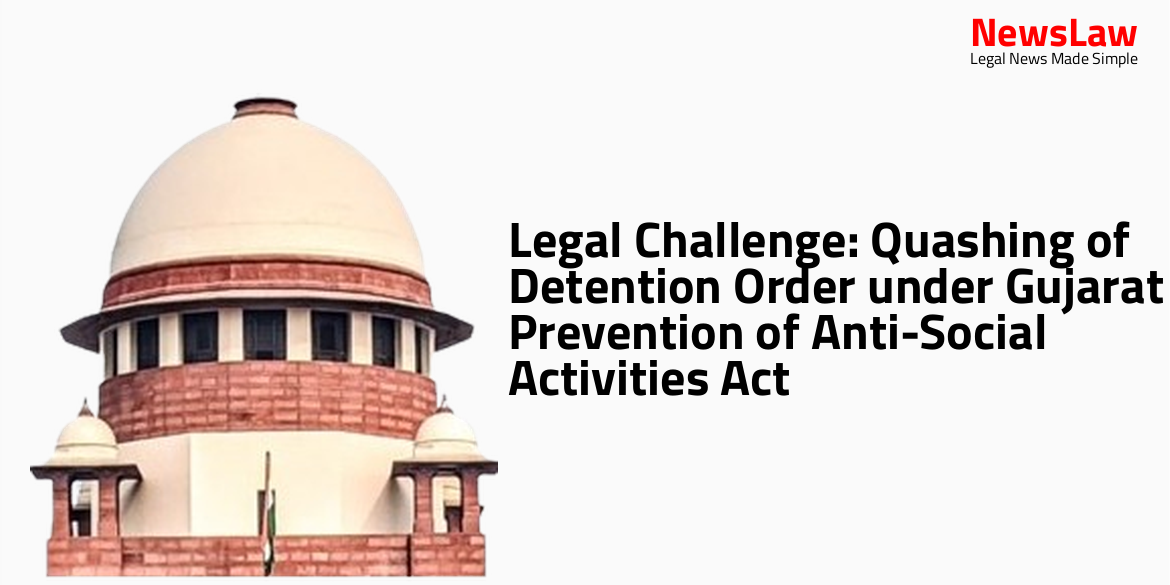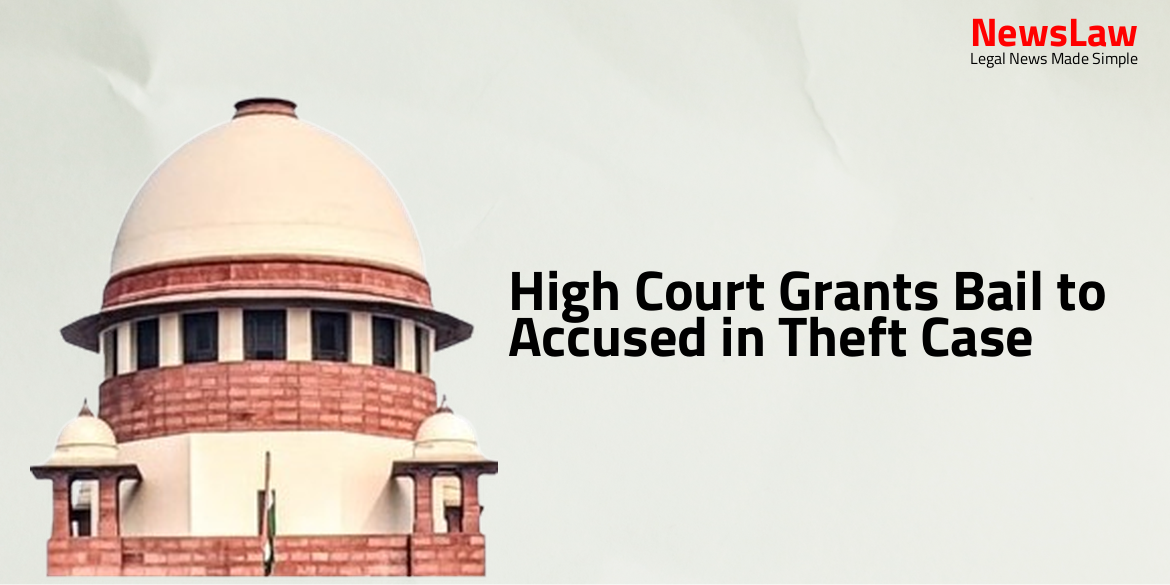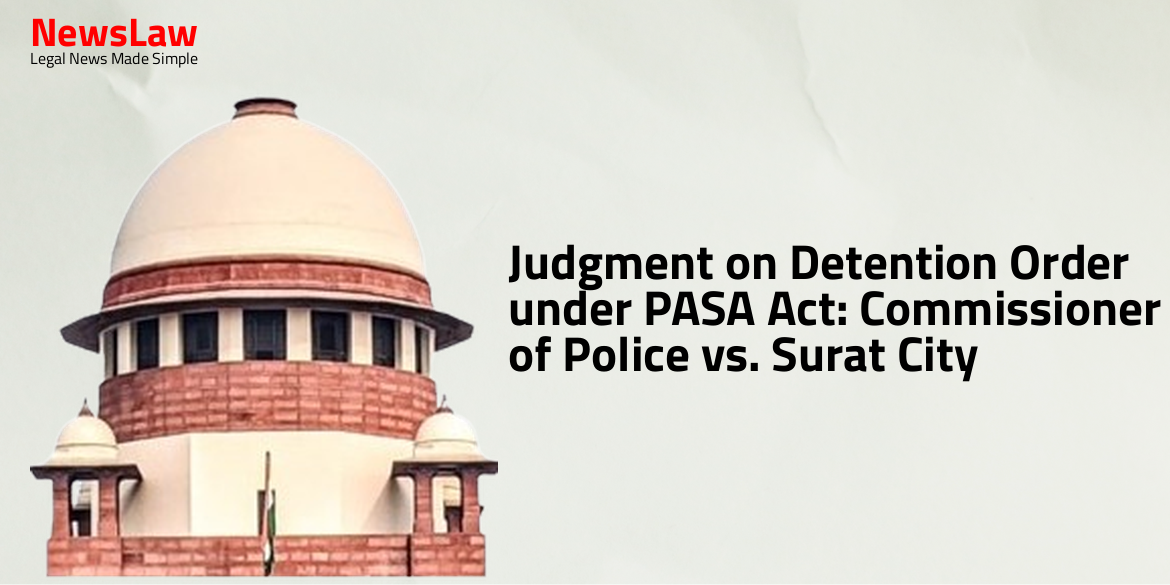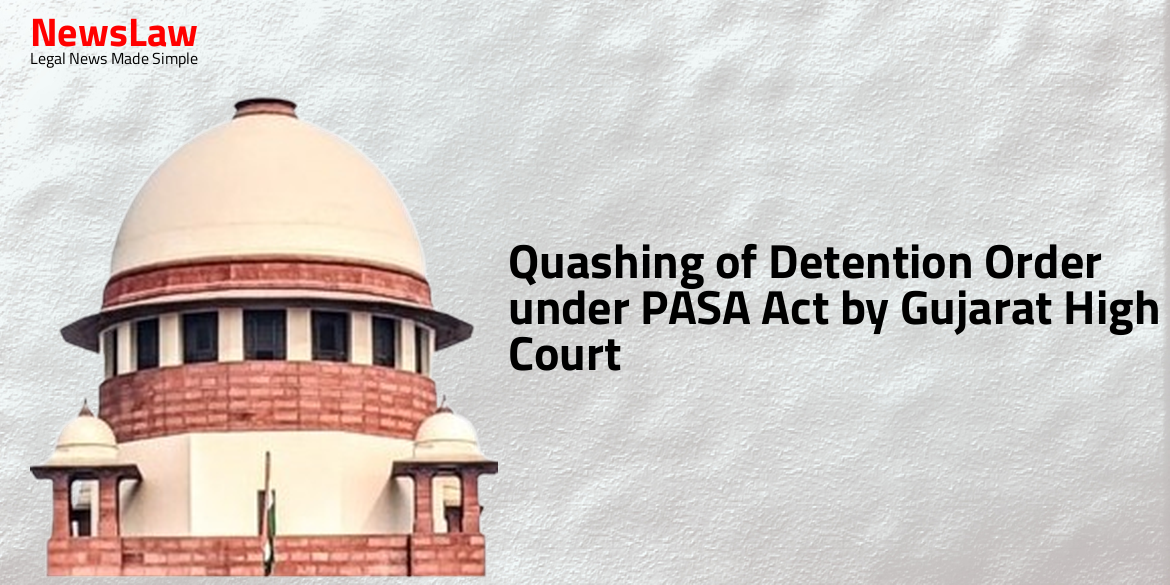In a recent judgment by the Gujarat High Court, the detention order dated 06.01.2024 under the Gujarat Prevention of Anti-Social Activities Act has been challenged. The detenue, under this Act, is contesting the legality of the detention order. The court carefully examined the grounds presented by the detaining authority and the petitioner’s counsel’s arguments against them. Stay tuned to learn more about the case and its impact on preventive detention laws.
Facts
- The present petition challenges the detention order dated 06.01.2024 passed by the detaining authority under the Gujarat Prevention of Anti-Social Activities Act, 1985.
- The petitioner, who is the detenue under the Act, is challenging the legality of his detention.
- The detaining authority passed the order under Section 3(1) of the Act to detain the petitioner.
- The petitioner’s counsel argued against the legality of the detention order during the hearing.
Arguments
- The petitioner’s advocate argues that the detention order is based solely on the registration of three FIRs related to theft offenses, which are not sufficient to classify the petitioner’s actions as a breach of public order.
- It is emphasized that the petitioner being on bail for all the offenses was not taken into consideration by the detaining authority.
- The AGP for the State supports the detention order citing sufficient evidence found during the investigation indicating the petitioner’s habitual involvement in activities under Section 2(c) of the Act.
- The petitioner’s advocate contends that the alleged illegal activities do not connect to the maintenance of public order but rather relate to law and order.
- The detaining authority is criticized for not considering the impact of the petitioner’s actions on public order beyond the criminal cases registered.
- Both sides presented their arguments in support of their positions.
- The detaining authority’s subjective satisfaction is found to be legal and valid
- The offences alleged in the FIRs do not impact public order as required under the Act
- Other relevant penal laws are sufficient to handle the situation
- The allegations against the petitioner-detenue are not relevant for Section 2(c) of the Act
Analysis
- Detention orders need to be passed with consideration for Articles 21 and 22 of the Constitution of India.
- The concept of law and order, public order, and security of the State are like concentric circles where the threat posed by an individual must be significant to disturb the whole social apparatus.
- The detaining authority must show concrete evidence that the individual poses a threat to public order beyond ordinary criminal law procedures.
- Case laws have clarified the criteria for invoking preventive detention.
- It is crucial to have specific grounds and evidence to justify detaining an individual under preventive detention laws.
- District Magistrates can act to prevent subversion of public order but not merely to maintain law and order in regular circumstances.
- The absence of clear evidence regarding the detenue’s actions posing a danger to public order weakens the case for preventive detention.
- The distinction between disturbance to ‘law and order’ and disturbance to ‘public order’ is crucial.
- The contravention of any law affects order, but for it to affect public order, it must impact the community or the public at large.
- The Apex Court has reiterated that preventive detention powers are exceptional and draconian, and the contravention of law must affect public order to warrant such detention.
- Recent decisions have highlighted concerns about the routine and unjustified use of Preventive Detention Laws in the State of Telangana.
- The Court emphasizes the need for a proper evaluation of detention orders against lawful standards.
- Every breach of peace does not necessarily lead to public disorder, emphasizing the need to distinguish between disorder and public disorder.
- The distinction between ‘law and order’ and ‘public order’ is crucial, with public order disturbances being of a more serious nature affecting the community or public at large.
- The Apex Court has observed that an act may affect law and order but not public order, showcasing the need for a clear understanding of these terms in legal proceedings.
- The personal liberty of an accused cannot be compromised based on preventive detention alone, especially when implicated in a criminal proceeding.
- The Apex Court has emphasized the necessity of exercising caution while using preventive detention powers and ensuring they are not misused as a substitute for regular law enforcement processes.
- Article 22 must be read as an exception to Article 21
- Exception under Article 22 can apply only in rare and exceptional cases
- Personal liberty protected under Article 21 is of high value
- Detaining authority must show meticulous compliance with the law
- Simple registration of FIRs does not have a nexus with breach of public order
- No relevant material existed for invoking power under Section 3(1) of the Act
- Petition allowed and the detention order dated 06.01.2024 quashed
Decision
- Petitioner – the detenue is ordered to be set at liberty immediately, unless needed in another case.
- The rule made absolute to the extent mentioned.
- Direct service is allowed.
Case Title: LOKESH SHIVCHARAN MEENA Vs. STATE OF GUJARAT
Case Number: R/SCA/744/2024



